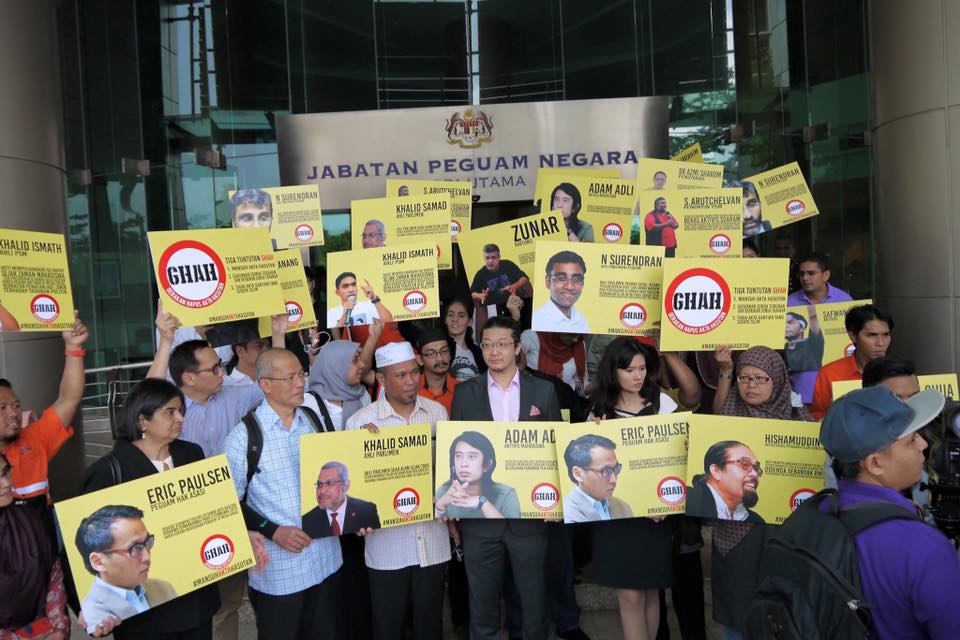Dear Anwar, the Sedition Act is not the sole answer to your 3R problems

On March 8th 2018, exactly two months before the historic 14th general elections, Pakatan Harapan launched its election manifesto, where it promised to do away with tyrannical laws, among them the colonial-era law Sedition Act 1948.
“Malaysia’s legal system is frequently abused by the leaders of UMNO and Barisan Nasional to achieve their political interests. Some of these laws were inherited from the British colonial era without amendment to improve weaknesses,” said PH in its Buku Harapan.
The coalition - which had witnessed its leaders being arrested and charged under the Act by the increasingly autocratic, kleptocratic BN - created a strong case to the voters that these laws need to be repealed for Malaysia to transition into a mature, genuine democracy.
Millions of Malaysians bought the case and eventually catapulted the coalition to Putrajaya on May 9th that year with the hope that a PH government would repeal these tyrannical laws. Unfortunately, their dream was shortlived as these very laws were retained by then prime minister and local-bred pharaoh Dr Mahathir Mohamad, to no one’s surprise.
Fast forward to 2023, the PH-dominant unity government is ramping up the usage of the Sedition Act to crack down on racial, religious and royalty (famously dubbed 3R by this government) discourses. According to the human rights group Suaram, the Act was used in 28 cases last year, a 65% increase from 2022 which only saw only 17 cases.
Why was there an overuse of the Act? The answer was simple: Perikatan Nasional’s toxic rhetoric on 3R (race, religion and royalty).
PN’s 3R rhetoric and sedition
PN, being an overwhelmingly Malay-Muslim coalition, thrives on stirring up Malay supremacist and Islamic sentiments to remain relevant, and that means constantly making inflammatory statements on how Anwar Ibrahim’s government that is “liberal, secular and DAP-controlled” threatens the Malay rights and Islam in this country.
Occasionally, some of its leaders, namely Kedah menteri besar Sanusi Nor and PAS president Abdul Hadi Awang would come under hot soup for allegedly making statements that are insulting towards the Malay monarchs in this country.
It did not take long for PN to prove itself to be much more toxic than the now-defunct Muafakat Nasional (MN) in spewing 3R bile, which PH simply could not tolerate.
After all, 3R rhetoric by Bersatu and MN brought down the PH government in Feb 2020, and the latter does not want to see history repeat itself. The coalition then turned to the Sedition Act - the very law it spent years calling for repeal, and saw the "answer" to PN’s 3R problem. Then, came the deluge of sedition charges against PN leaders.
With the frequent 3R offences made by PN leaders, many would think that it is justified to keep the Sedition Act around. Then, came the abuses.
In November last year, Bersatu information chief Razali Idris was charged with sedition for allegedly making a statement that the government controlled the Malaysian Anti-Corruption Commission (MACC) and the judiciary branch.
Two months later, controversial blogger Wan Azri Wan Deris, also known as Papagomo, was charged with sedition for allegedly claiming that the unity government is “pro-Israel and Western nations”. Politically astute Malaysians would know that Asri's comments are comically false given Malaysia's unquestionable allyship towards the Palestinians under Prime Minister Anwar Ibrahim's helmsmanship.
The claims made by both Razali and Asri are indeed excessive and defamatory. But it is indeed overkill to charge both of them under the Sedition Act - especially when there is Section 499 of the Penal Code that deals with criminal defamation.
Mounting backlash
The backlash from rights groups and other concerned stakeholders was quick and mounting, with many registering their disappointment with PH for having reneged on its past election pledges to repeal the law.
Anwar’s government eventually “gave in” to the critics with the announcement of a review of the Act so that it could only be used against those who insulted the monarchs. It argued that the law is still necessary to deal with such crimes.
Last month, Home Minister Saifuddin Nasution Ismail said that the Cabinet has agreed to commence the process of amending the Act, with the objective of not tightening controls but determining how the Act can be invoked to manage the 3R (race, religion and royalty) phenomenon.
It is becoming crystal clear that the government has no plans to replace the Act.
Public harmony laws
This Madani government appears to be "living in a pretension" that the Sedition Act is the right law to be used to deal with 3R bile when the truth is that there are alternatives presented for this law. One would have to “rewind” to the last decade.
In 2012, former prime minister Najib Razak, now a high-profile occupant of Kajang Prison, said he would abolish the Sedition Act because it “represents a bygone era” and replace it with the National Harmony Act.
The National Harmony Bills, he said, would consist of the Racial and Religious Hate Crimes Bill, the National Harmony and Reconciliation Bill, and the National Harmony and Reconciliation Commission Bill. The Racial and Religious Hate Crimes Bill specifically targets hate speech, something which is absent in the Sedition Act.
But of course, Najib was never genuine in pushing this legal reform as his second government of 2013-2018 ended up having arrested, investigated and charged more people for alleged sedition than in the entire 55 years of post-Merdeka Malaysia prior to that, according to Lawyers for Liberty’s N Surendran.
According to Surendran, there was a record of about 170 sedition cases in just three years between 2013 and 2016. In 2015 alone, during the peak of Najib's sedition crackdown, about 91 people were arrested, investigated or charged for sedition.
Najib's administration charged more people for sedition than the previous administrations of Tunku Abdul Rahman, Tun Razak Hussein, Hussein Onn, Abdullah Ahmad Badawi and Mahathir put together, said the lawyer.
The former Umno leader, who is currently paying the price (is he?) for his crimes, has left behind the National Harmony Bills, a genuinely good piece of legislation proposal which should be considered by Anwar’s government.
Even former Bar Council president Karen Cheah, who is no ally of Najib, suggested that the government introduce the same Bills. These bills, said Cheah, would help in “achieving the balance of upholding freedom of speech while maintaining public security”.
For PH, enacting these public harmony laws might be seen as recognising the former kleptocrat-in-chief. But the coalition has no choice at the moment.
The slow pace of reforms from PH is fast alienating the coalition from the voters. This was evident from negative online sentiments towards PH, and poor voter turnout at the coalition’s strongholds Penang and Selangor in the August 2023 state elections, which led to severe loss of seats for Anwar’s party PKR.
If Anwar does not want to further risk bleeding support from these voters (especially the liberals and progressives) come the next general elections, then he has to swallow his pride and adopt the National Harmony Act.
It is high time that reformist backbencher MPs in PH push the prime minister to repeal the Sedition Act and adopt the National Harmony Bills. Improvements can be made to these bills should they have zero provisions that could shield the monarchs from acts of treason and seditious comments through engagements with legal scholars and the Bar Council.
Good laws do exist to replace the Sedition Act. It is just that this government needs to stop pretending that it doesn't exist.
-END-
Note to readers:
- Did you find any errors in the article? Please email TMS at mutiarasentinel@gmail.com
- If you enjoyed the article, donate and subscribe to the blog and get yourselves updated on more blog content.





Member discussion